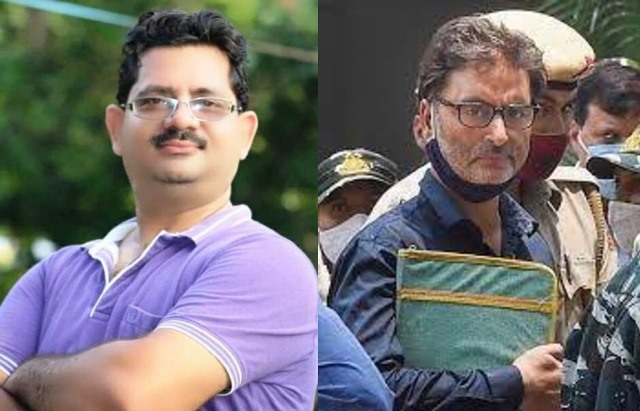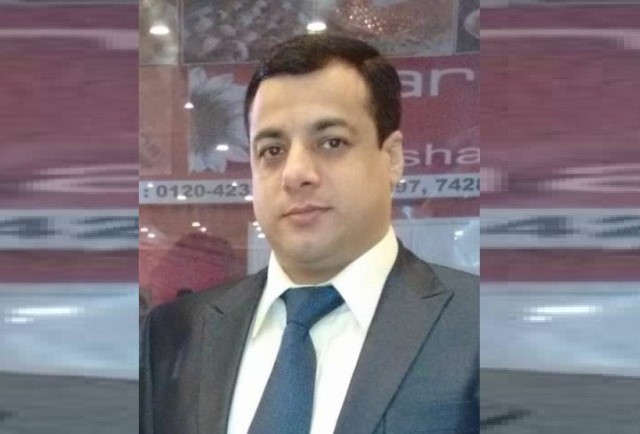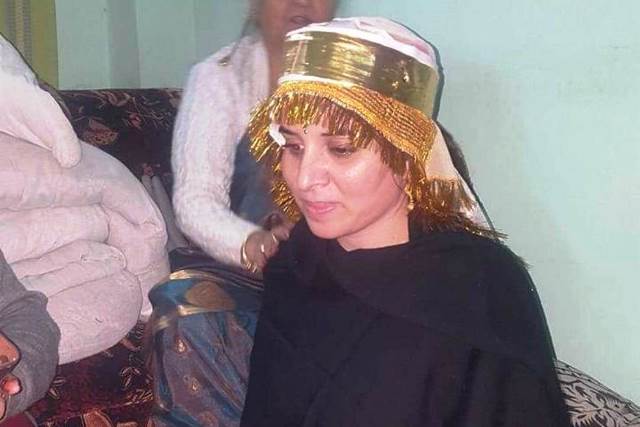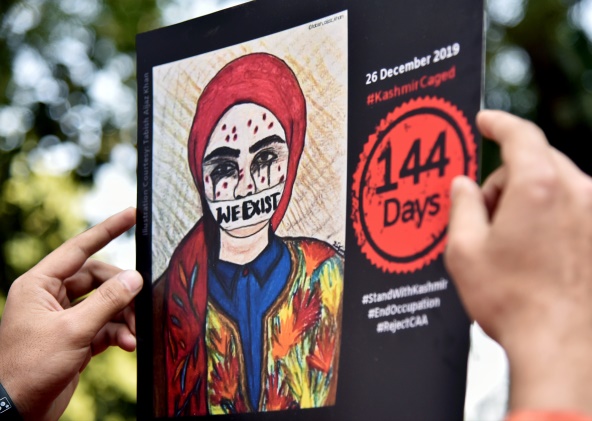Between
the multiplying rainbows of Shaheen Baghs all over the country and new waves of
mass non-violent protests, the resounding defeat of hate politics and the
victory of AAP’s s welfare agenda of health, education, bijli and paani in Delhi,
and new videos of unprecedented police brutality on students in Jamia right
inside the reading rooms the library, has the nation forgotten Kashmir,
under a military and communication lockdown since August 5, 2019?
Has
the world too chosen to allow the BJP regime get away with the total violation
of the Indian Constitution in Kashmir, the denial of fundamental rights, and
the continued detention under draconian laws of three former chief ministers,
and scores of others, on flimsy and bizzare grounds?
Surely,
all indications are there that in the frozen white expanse of the Valley, with
the snow still refusing to melt, the simmering angst and anger at the grave
injustice done to its 8 million people remain etched like a dark and relentless
memory in infinite bad faith. And this memory moves in a circle of tragedy,
outrage and despair, beyond the ruling regime’s rhetoric of ‘national security
and terrorism’, troubling the democratic conscience of the nation and the
world. The undiplomatic behavior of the current regime has not helped matters.
This
has been starkly reflected in the rejection of visa to British Labour Party MP
Debbie Abrahams. She was allegedly denied entry into India and was “deported”
at the Delhi airport on Monday after landing there. Her e-visa, surprisingly,
was rejected. Chairperson of the All Party Parliamentary Group for Kashmir, the
British MP has alleged that she was indeed “treated like a criminal”. She said
the immigration officer was rude and aggressive, and shouted at her — “come
with me”.
She
had apparently written a letter as a chair of the British group on Kashmir, to
the Indian envoy, expressing serious concern on the abrogation of Article 370
in Kashmir. If that be the reason for her ‘deportation’ in such humiliating
conditions, then it only reflects, yet again, the insecure foreign policy
initiatives marking this government.
Earlier,
New Delhi had botched up badly by inviting a group of Rightwing and Far-Right
politicians from abroad, organised by an unknown and shadowy organization, for
a sponsored sojourn to Kashmir, with doctored meetings with planted pro-BJP
loyalists, and officials. The entire exercise turned out to be a big disaster.
Besides,
despite the best efforts of the external affairs ministry, Kashmir did become
‘internationalised’ even while top media organisations in the West, like the New York Times, Washington Post, BBC, The
Guardian etc., blasted the Delhi government for human rights violations in
Kashmir. The media trend seemed to have continued in the recent past, despite
the best efforts in lobbying by the external affairs ministry.
Recently,
25 foreign envoys were taken to Jammu and Kashmir for yet another diplomatic
foray to mark a paradigm shift in global opinion. The French Ambassador, Emmaneul Lenain, made
a loaded but crypic statement. He said that while the government was making
“significant efforts” to “normalise the situation”, the remaining restrictions
should be removed “as soon as possible”.
One
day earlier, EU spokesperson for Foreign Affairs and Security Policy Virginie
Battu-Henriksson had categorically stated: “Some restrictions remain, notably on Internet access and mobile
services, and some political leaders are still in
detention. While we recognise the serious security concerns, it is important
that the remaining restrictions are lifted swiftly,” she said.
The fact is that India’s relation with a big chunk of
the powerful EU has been marked with a certain pronounced bad faith since
August 5, which has only been aggravated by the massive protests all over the
country against the controversial Citizenship Amendment Act and the National
Register of Citizens. In January last, as many as 626 of the 751 members of the
EU Parliament took up six resolutions concerning Kashmir and discriminatory laws for
discussion creating much concern in the Indian ruling establishment. It has
postponed a vote on the resolution, but the discomfort is for the whole world
to see. Indeed, most top university
campuses in the West have stood up in support of the protests against the
CAA/NRC in India.
Earlier, despite Donald Trump’s big brotherly affection
for the Indian prime minister, several top leaders in American politics,
especially among the democrats, have taken up the issue of Kashmir and the
willful discrimination against the minorities in India under the current
regime. With the United Nations taking
it up after more than 70 years, and China upping the ante, the Pakistani Prime
Minister, Imran Khan, brought back bad memories of fascism under Adolf Hitler
in Europe while talking about the Indian situation vis-à-vis Kashmir.
Meanwhile,
the imposition of the draconian Public Safety Act (PSA) on two former chief
ministers, Omar Abdullah and Mehbooba Mufti, without an iota of evidence to
prove the charges, has been widely criticised in India. The allegations in the
dossier against them are bizarre and smacks of mindless vendetta, and does not
really add up to the moral high ground around the prime minister or his best
buddy, the Union Home Minister, Amit Shah, who also led the botched-up Delhi
elections with a daily cacophony of lies, crude hate politics and muscle
flexing.
For
instance, Omar Abdullah, who has also been part of the BJP-led NDA regime in
Delhi under Atal Behari Vajpayee, has been accused of subversive activities.
“The capacity of the subject to influence people for any cause can be gauged
from the fact that he was able to convince his electorate to come out and vote
in huge numbers even during peak of militancy and poll boycotts,” reads the
alleged government dossier, accessed by NDTV.
Apparently,
his last tweet hours before the imposition of the communication and military
lockdown, while being arrested, said: “Violence will only play into the hands
of those who do not have the best interests of the state in mind. This wasn’t
the India Jammu and Kashmir acceded to, but I’m not quite ready to give up hope
yet. Let calm heads prevail. God be with you all.”
Journalists in Kashmir are up in
arms against the hounding and harassment of mediapersons by the authorities.
Some journalists were asked to disclose their sources, even as the internet
lockdown and the military clampdown restricted freedom of press to a minimal in
the Valley. Journalists say that theirs is overt and tacit censorship at all
levels.
Locals say tourism in the Valley has
touched an all-time low, unemployment is at an unprecedented high while all
educational institutions are closed. And with regards to detention, the focus
has become concentrated on the politicians. There is little mention of scores
of others, including youngsters, who are lodged in jails outside the state (now
Union Territory)! There is a widespread belief in the valley that several
youngsters and other innocents are still imprisoned in various jails,
especially in UP, with mothers and relatives just not able to track them.
The
Supreme Court has given notice to the Centre and the J&K administration, on
a petition filed by Omar’s sister, Sara Abdullah Pilot who had petitioned that the exercise of powers by
authorities under the CrPC to detain individuals, including political leaders,
was “clearly mala fide to ensure that the opposition to the abrogation of
Article 370 of the Constitution is silenced”.
The petition said that “similar
orders of detention have been issued by respondents (authorities of the union
territory of J&K) over the last seven months in a wholly mechanical manner
to other detinues, which suggest that there has been a consistent and concerted
effort to muzzle all political rivals”.
Her petition
pointed out there is no new evidence or material available available to detain
a person who has already been under detention for six months and the
“grounds for the detention order are wholly lacking any material facts or
particulars which are imperative for an order of detention.”
In
the same manner, the dossier against Mehbooba Mufti, who was the last chief
minister in the state in an alliance with the BJP, is full of absurd
allegations. “In new India, dossier on
an ex-chief minister slapped with draconian PSA mentions insidious machinations
& being a ‘Daddy’s girl’ as charges,” her daughter Iltija Mufti had
tweeted.
“Not
unusual that she adored, respected & loved her father. They had an
unshakeable bond & were each other’s closest confidante. Which is why she
honoured Mufti sahab’s commitment after his sudden death in 2016. Didn’t know
loving your parent constitutes a crime,” she wrote. This is a question
that needs to be answered if current regime wishes to honour the legacy of Atal
Bihari Vajpayee who spoke about insaniyat
(humanity), jamhooriyat (democracy)
and Kashmiriyat.





